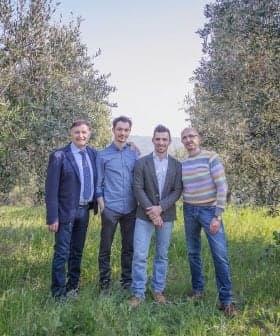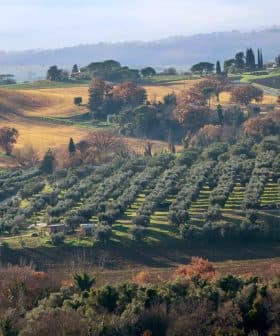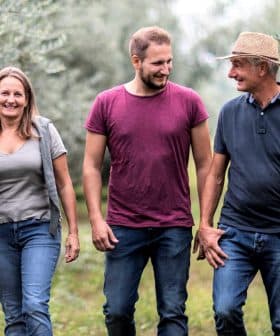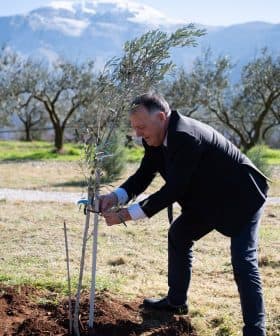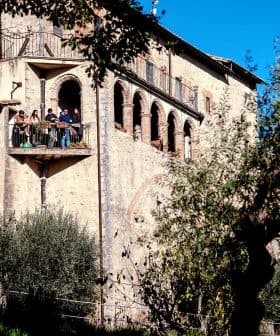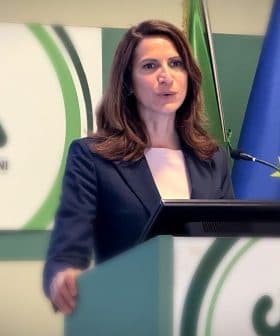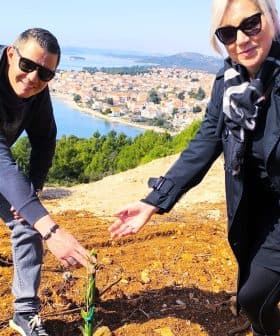Olive Oil Production Revived in The Former Papal States
In Latina and Frisone, just south of Rome, producers are working to increase yields and quality while promoting oleotourism and their historic connection to the Vatican.
 Domenico Sperlonga, Carlo Gallozzi and Pope Francis. Image courtesy of Vatican Media
Domenico Sperlonga, Carlo Gallozzi and Pope Francis. Image courtesy of Vatican Media Olive oil producers in Latina and Frosinone, Italy are collaborating to promote the region’s olive oil culture, which has historical ties to the former Papal States. The Olio dei Papi initiative, recognized by the Vatican, aims to revive olive oil production in the area, with a focus on sustainability and quality, through a strict production protocol and the recovery of abandoned olive groves.
Olive oil producers, farmhouses and touristic entities in the provinces of Latina and Frosinone, just south of Rome, are teaming up to promote the region’s olive oil culture and history, which are closely tied to the former Papal States.
At a public event in Saint Peter’s Square in Rome, Pope Francis was presented Olio dei Papi (Popes’ olive oil, in Italian), an extra virgin olive oil that comes from trees grown on land supervised and financed by the Vatican.
Producers here have been making world-class extra virgin olive oil for generations, but they never found a good way to connect their product to their story and to narrate their traditions.
Several participants in the meeting told Olive Oil Times that Pope Francis thanked his guests for the gift and the historical work behind the Olio dei Papi initiative.
“It is allowing us to re-discover the history of the Church,” he said. The Vatican has formally recognized Olio dei Papi as the official supplier to the Vatican State.
See Also:Olive Oil Production Continues at Historic Home of Emperor HadrianOngoing research sent to the Vatican and seen by Olive Oil Times confirmed the important role that olive oil played in Roman culture. Romans used olive oil as food, lubricant, fuel for lamps and cosmetics.
However, the trees and fruits were neglected after the collapse of the Roman Empire and during the Middle Ages. During this period, groves were only grown near abbeys, monasteries, and other ecclesiastical lands.
This changed during the 18th Century due to a series of reforms that created incentives for olive farmers in central Italy, which the church governed. The goal was to substantially increase local olive oil production, as Rome was often forced to import it from abroad.
“In the year 1778, Pope Pio VI introduced a substantial agricultural reform which focused on the development of olive growing,” Martina Bocconi, a city councilwoman in Boville Ernica and co-author of the draft study, told Olive Oil Times.
“A high volume of notes from the Apostolic Chamber of that region shows how the chamber strictly monitored the olive tree expansion, providing a Paolo [the currency of the time] as a reward to all olive farmers who planted new trees,” she added. “It also provided even more funds if the new olive groves were planted through land reclamation of unproductive areas.”
As a result of the organization and Papal State funding, hundreds of thousands of trees were planted over time in the region historically known as Latium.
According to the draft paper, at least 27,000 hectares of Latium were devoted to olive growing in 1813, yielding close to three million kilograms of olives. More than 100 olive oil mills were active in the region.
It is believed that 200,000 new olive trees were planted in the State of the Church by 1830. By 1877, the olive farming surface in the Latium region had been expanded to 41,600 hectares.
Given the strong relationship between the history of the Papal States and the development of olive growing in the area, the Boville Ernica municipality launched the Olio dei Papi development project which will expand to other cities.
“Our idea is to create a cammino (“path,” in Italian) that starts with the history of olive farming in the Papal States and stretches to modern olive oil making,” Bocconi said. “It is an idea that is attracting many, so we are actively working for an agreement among all municipalities involved in this cammino.”
“It connects extra virgin olive oil production and farming development with touristic opportunities,” she added. “The Latium regional authorities have taken notice and we hope the whole thing will reach a growing number of olive oil producers and other stakeholders over time.”
The cammino will include important historical locations, such as the abbeys of Fossanova, Trisulti, Montecassino and Casamari, and will involve food producers, farmhouses, restaurants and artisans.
The first Olio dei Papi-branded extra virgin olive oil is now being produced and marketed by the joint venture among a local cooperative with more than 5,000 small olive oil producers and a local mill.
Olio dei Papi production protocol defines the territory considered part of the initiative and the olive varieties that contribute to its production.
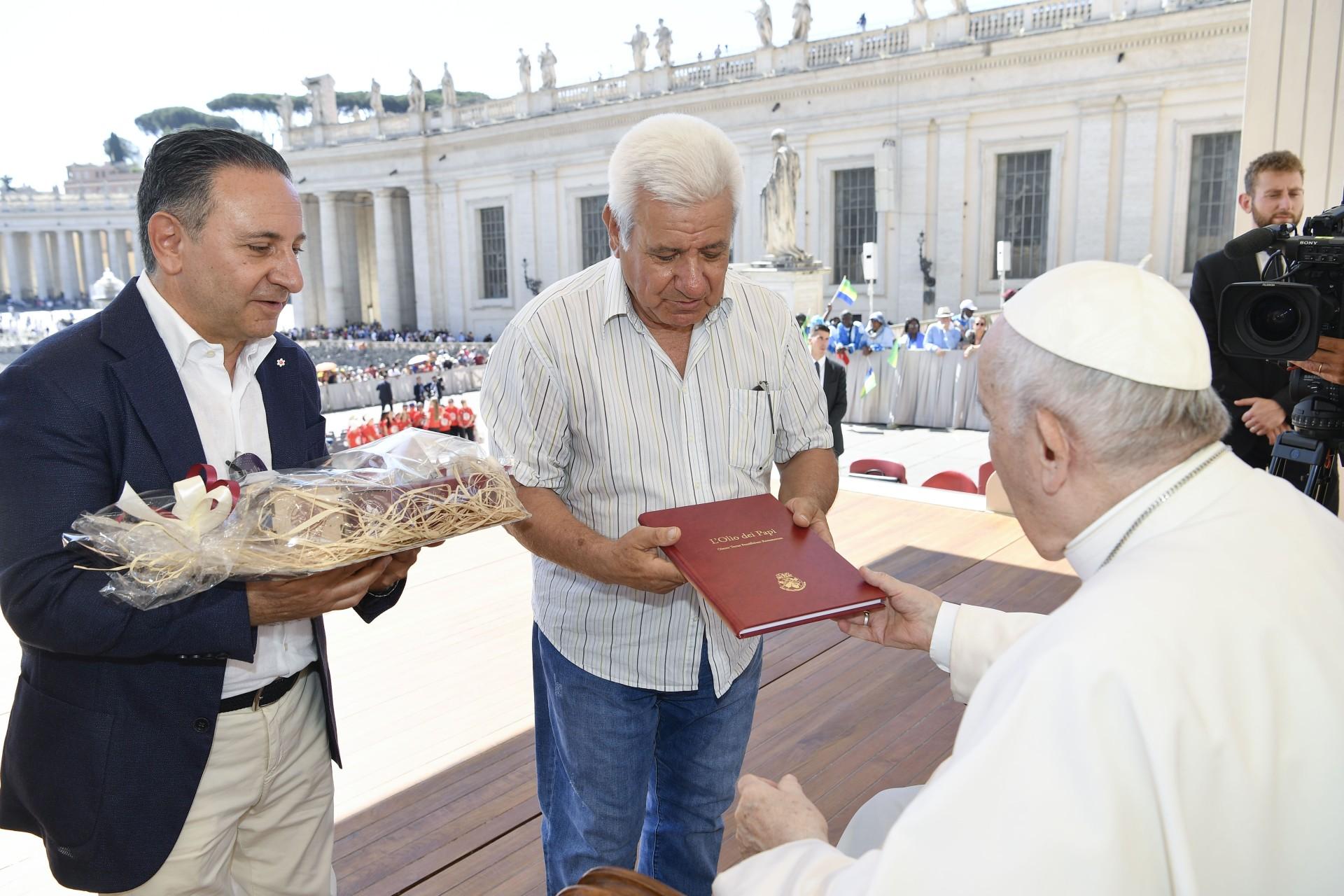
Domenico Sperlonga, Carlo Gallozzi and Pope Francis (Image courtesy of Vatican Media)
While some of the involved varieties are widely distributed in Italy such as Frantoio, Moraiolo, Leccino and Itrana, others are considered native, such as Carboncella, celebrated for its high content of polyphenols. The native varieties constitute at least 30 percent of the Olio dei Papi.
“Our initiative is based on three main pillars,” Domenico Sperlonga, a miller and co-director of the Olio dei Papi project, told Olive Oil Times. “The first one is the product chain agreement with the cooperative, which ensures the origin of the olives and the approach to harvest the olives that we have to transform.”
“The second is a very strict high-quality-oriented production protocol, and the third is the ethical pillar,” he added. “Within the product chain, the producers have established a minimum price reserved for their olives. The goal is to reward more those who aim at sustainability and better quality, which already happened under the State of the Church rule.”
According to its promoters, the Olio dei Papi initiative is destined to benefit the region and restart olive production, even in those areas where such activity has slowed over time.
“That is also why in the project we have added the goal of recovering abandoned olive groves,” Sperlonga said. “We hope Olio dei Papi will boost olive oil production in our area and the whole Latium region.”
In the project’s first phase, the regions being considered are in southern Lazio and northern Campania.
However, the Papal States stretched well beyond these areas, and Sperlonga hopes the project will benefit more producers in other regions. “That is also why we are organizing seminars and workshops, to let people know more about this project and its implications,” he said.
One of the key portions of the project is the development of a blockchain process to guarantee the origin of the product on the national and international market.
“We are working on that. In the meantime, we already have a form of total traceability,” Sperlonga said. “Customers can use the number found on our labels to check directly from our website where their bottle comes from.”
“The system is so precise that they can not only know the complete data about the producers of that specific olives but, thanks to Google Earth, they can even spot the exact grove,” he added.
According to Sperlonga the historical research and the increase in activities that come from the initiative might finally bring due recognition to the quality of local extra virgin olive oil.
“Producers here have been making world-class extra virgin olive oil for generations, but they never found a good way to connect their product to their story and to narrate their traditions,” he concluded. “Thanks to such unique historic background, all of this is destined to change.”
Share this article



